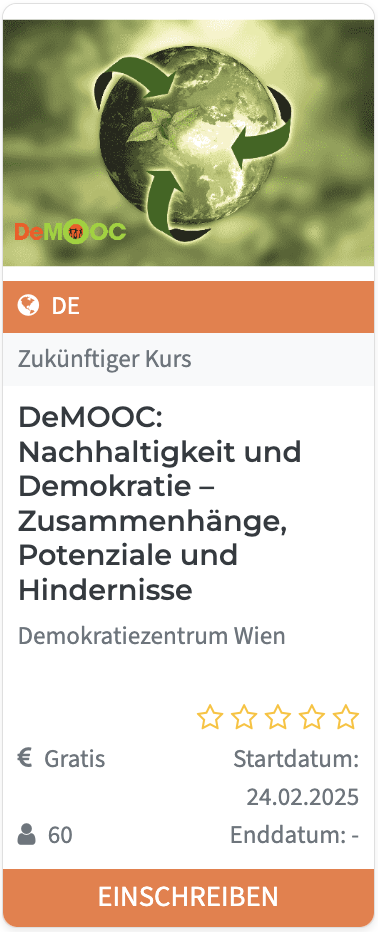Das Demokratiezentrum bereichert die iMooX.at Plattform um einen weiteren MOOC zu „DeMOOC: Nachhaltigkeit und Demokratie – Zusammenhänge, Potenziale und Hindernisse„
Der MOOC „DeMOOC: Nachhaltigkeit und Demokratie – Zusammenhänge, Potenziale und Hindernisse“ stellt eine inhaltliche Erweiterung und Vertiefung des DeMOOC dar. Mit kompakt erarbeiteten Informationstexten richtet sich der Kurs an Lernende, die sich über Frage- und Problemstellungen zu Nachhaltigkeit bzw. nachhaltiger Entwicklung vor allem vor dem Hintergrund ihrer sozialen, ökologischen und (demokratie-)politischen Dimension informieren möchten. Darüber hinaus bietet der Kurs multimediale, fachliche Inputs zur Erarbeitung und Reflexion der Inhalte sowie Beispiele und Materialien für die didaktische Aufbereitung als Anregung für die Bildungsarbeit. Somit ist der Kurs auch für Unterrichtende und Multiplikator:innen geeignet, die Fragen rund um Nachhaltigkeit als handlungsleitendes Prinzip, politische Agenda und Bildungsziel in ihre Bildungsarbeit einbinden möchten.
Der MOOC knüpft zwar thematisch an vorherige Kurse der DeMOOC-Serie an, kann jedoch unabhängig von diesen absolviert werden
Wie immer ist die Teilnahme kostenfrei: [Anmeldung zum Online-Kurs]








